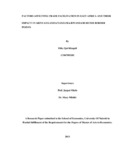Factors affecting trade facilitation in East Africa and their impact on Kenya/Uganda/Tanzania/Rwanda/Burundi border points
| dc.contributor.author | Ebby, Khaguli | |
| dc.date.accessioned | 2013-11-19T08:33:39Z | |
| dc.date.available | 2013-11-19T08:33:39Z | |
| dc.date.issued | 2013 | |
| dc.identifier.citation | Master of Arts in Economics | en |
| dc.identifier.uri | http://erepository.uonbi.ac.ke:8080/xmlui/handle/123456789/59437 | |
| dc.description.abstract | The paper investigated the factors affecting Trade Facilitation at the border points of East Africa and their impact on Trade Facilitation.. The goal of this study was ultimately to answers the question as to whether Facilitation can reduce costs of doing business and if Trade Facilitation leads to economic growth of East African countries. The paper utilized the Gravity Model to establish the relationship between variables. The model was run using a fixed effect and a random effect .Horseman test was later on conducted to determine between the fixed effect and random model which was suitable. Secondary data was sourced from World Bank data base and CEPII, International Monetary Fund (IMF) year book.. Empirical results indicated that the border points in East Africa play an important part in Trade Facilitation if impediments to trade are addressed. The 8 border points in the study exhibit cross cutting non tariff barriers which impact negatively on Trade Facilitation and increase costs of doing business . Trade facilitation leads enhanced trade flows and economic growth. Recommendations made is that governments should invest in Trade Facilitation initiatives for economic growth of East African Countries among others. | en |
| dc.language.iso | en | en |
| dc.publisher | University of Nairobi | en |
| dc.title | Factors affecting trade facilitation in East Africa and their impact on Kenya/Uganda/Tanzania/Rwanda/Burundi border points | en |
| dc.type | Thesis | en |

